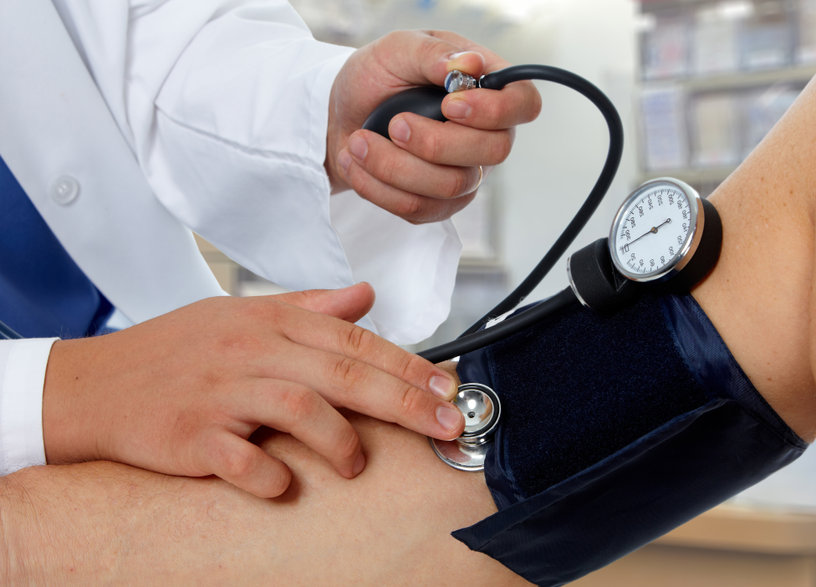Your primary care provider tells you that you have high blood pressure, also known as hypertension. What does that even mean? How do you treat it? Read on to learn more about hypertension, lifestyle changes that can help, and different medications to treat it.
Read about Common Blood Pressure Side Effects here.
What is hypertension?
Before we define hypertension, let’s talk about blood pressure. Blood pressure is the force of your blood pushing against the walls of your blood vessels as it travels throughout your body. There are actually two forces created by your heart beat: systolic and diastolic pressure. Systolic pressure (the top number of a blood pressure reading) occurs as blood pumps out of your heart and into your body; diastolic pressure (the bottom number of a blood pressure reading) is created as your heart rests between beats. Blood pressure is measured in mm Hg.
Hypertension, or high blood pressure, occurs when the force of your blood pumping through your body is regularly too high. Your doctor will diagnose you with hypertension based on the numbers in the chart below:
You may have high blood pressure without even feeling it. Just because your body isn’t showing signs of hypertension, long term damage to your heart and blood vessels may be happening. This damage can eventually lead to more serious conditions, such as heart attack or stroke. It is important that you follow your healthcare provider’s instructions on how to manage your high blood pressure, including taking your medication as directed and making healthy lifestyle choices.
What are the best medications to treat high blood pressure?
There is no one “best” medication to treat high blood pressure. Sometimes it takes multiple medications to get your blood pressure in a “normal” range. Everyone is unique and your body may respond to a certain medication better than someone else. Only your trusted medical provider can determine which medication, or even combinations of medications, you need to get your blood pressure under control.
There are three classes of medications that are considered first line treatment options for high blood pressure. You can learn more about them in the chart below:
What are some lifestyle changes I can make to lower my blood pressure?
Along with taking any medications that your medical doctor may prescribe you, there are several other changes you may be able to make that can help get your blood pressure to a healthy range and keep it there.
Eat a well-balanced, low-sodium diet: Many Americans eat too much salt in their daily diet, which can cause hypertension. The American Heart Association suggests an ideal limit of 1,500 mg of sodium per day for adults with high blood pressure. Sodium can be sneaky; learn how to read nutrition labels and reduce your intake of processed foods.
Many healthcare providers also recommend following the DASH diet, which stands for Dietary Approaches to Stop Hypertension. The DASH diet involves eating more fruits, vegetables, and whole grains as well as fat-free or low-fat dairy products, fish, poultry, beans, nuts, and vegetable oils. Try to limit sugar-sweetened beverages and treats, fatty meats, and full-fat dairy products.
Limit alcohol intake: Too much alcohol can also cause your blood pressure to rise above healthy levels. If you do drink alcohol, you should have no more than two drinks per day for men and no more than one drink per day for women. A drink is considered 12 oz of beer, 4 oz of wine, or 1.5 oz of spirits/liquor.
Exercise regularly: Regular physical activity can help lower your blood pressure; it can also help keep your heart strong, lower stress levels, and help you maintain a healthy weight. Most people should try to get at least 150 minutes of moderate-intensity physical activity each week. This might sound like a lot, but you can break it up into 30-minute periods five days a week. Find activities you enjoy, involve friends, and make it fun.
If you have high blood pressure or other heart conditions, make sure you talk to your medical doctor before starting any new exercise program.
Manage your weight: Along with increasing your blood pressure, being overweight can have many other negative health effects. Losing even five or 10 pounds can help lower your blood pressure and provide other health benefits. If you need to lose weight, talk to your healthcare professional about a healthy way to do so.
Stop smoking: Although the link to hypertension is unclear, smoking is a risk factor for heart attack and stroke. Each time you smoke, it also causes your blood pressure to increase for a short time. Quitting smoking is one of the best things you can do for your overall health. If you are having trouble quitting, speak with your healthcare professional or pharmacist about safe resources to help you stop smoking.
TL;DR: Hypertension, also known as a “silent killer,” can cause serious and irreversible damage to your body before you even realize it. If your medical doctor tells you that you have high blood pressure, it is important to take your medications as prescribed and incorporate healthy lifestyle changes to lower your risk of more serious cardiac events such as heart attack or stroke.











